Stakeholders in the agriculture sector have condemned the Monetary Policy Committee of the Central Bank of Nigeria (CBN) over its recent increase of interest rate from 24.75 per cent to 26.25 per cent. The experts, in separate interviews with FarmingFarmersFarms, lamented that the action would further add to the problems facing farmers and players in the sector and that it would make borrowing more expensive for agribusinesses.
They pointed out that it will further worsen the rising cost of living and food prices and it would push more Nigerians into poverty. The Chairman of the Lagos Chambers of Commerce and Industry, Agriculture and Agro-Allied Group, Kola Aderibigbe, said that an increase in interest rates will make borrowing more expensive for businesses and that it will completely limit economic growth and surely increase poverty level, as purchasing power continues to drop; day in, day out. He said that the purpose of increased interest rates, according to the CBN, is to control inflation, which is rising at alarming rates.
“This action will surely cause more rising food prices, which is food inflation that is already getting worse. It will invariably lead to the high cost of transportation and other logistics, further insecurity, food insecurity, post-harvest losses because the agricultural sector that requires more investments at affordable rates of borrowing are not privy to such”, he said. The Executive Director of Greenport Nigeria, Edobong Akpabio, in her view, said that though the CBN Governor, Yemi Cardoso stated that the increase is aimed at curbing the surging inflation, which currently stands at 33.69 per cent, while the decision demonstrates a proactive approach to achieving price and economic stability, but there are wider implications.
According to her, increased Monetary Policy Rate (MPR) would lead to higher borrowing costs for businesses and individuals, especially Small and Medium-sized Enterprises (SMEs), which could stifle innovation, growth, and job creation that the economy desperately needs. Akpabio also said that higher interest rates will worsen the rising cost of living and food prices and this will further strain the already limited financial resources of Nigerians, pushing many deeper into poverty. An agribusiness strategist, AfricanFarmer Mogaji, while sharing his thoughts, affirmed that it will further create a challenge for the agribusiness community because before increasing the interest rate, the interest rate of 24.75 per cent available was already killing the sector and the bank is not even lending to the real sector; the production sector and the likes.
“So now, even the ones that have taken the loans, it will be a challenge to repay, considering that all the inputs are dollarised, from seed to fertilizers and the likes, have been dollarised. It creates a bigger challenge for the SMEs, not only the smallholder farmers, but also the SMEs, who have taken one facility or the other. It will further give a huge challenge to the agribusiness value chain in Nigeria and I think that every time the CBN speaks now, there should be an exemption. Investors are already running because of herdsmen, insecurity, kidnapping and all that and so it is not looking economically-viable. So, the farmers and the SMEs will not automatically be able to take loans because they are heavily dependent on diesel, as the diesel (price) is high; all major input is high, electricity is high, nothing is affordable and available, so it’s going to have a backlash on food security and general insecurity in the country”, he added.




2 Comments
This increase in interest rate have crippled many agribusinesses. People are finding it hard to pay off their loans.
The steady decline in value of our currency has gotten worse